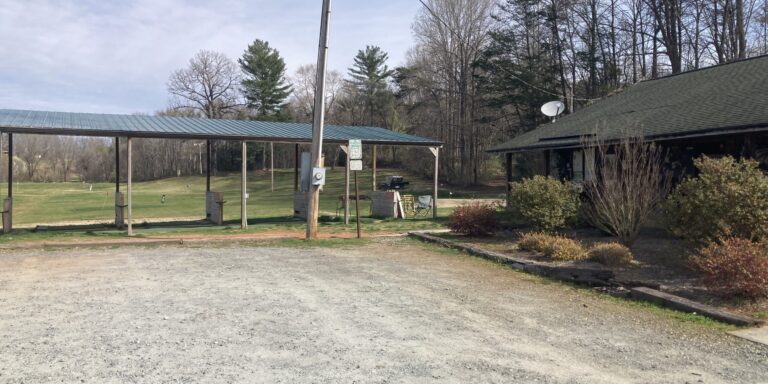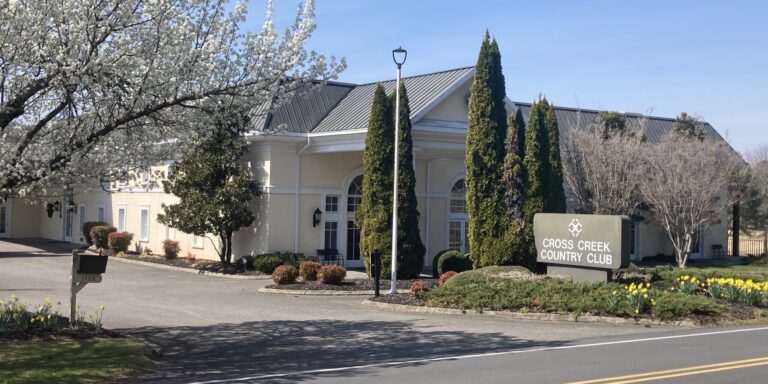Five years ago, Forest Oaks Country Club teetered on the brink of extinction. Today, it stands rejuvenated, boasting a golf course and amenities befitting a venue that once proudly hosted a PGA Tour event for three decades, from 1977 to 2007.
Under the stewardship of former members Terry Lee and Eddie Stephens, the Forest Oaks Country Club, nestled in Southeast Greensboro, has undergone a remarkable transformation. Neglected for years, this Ellis Maples-designed golf course has been revitalized through a series of renovations, breathing new life into its once-diminished allure.
On a recent day, Stephens, whose father was once on the club’s Board of Directors, and now runs the day-to-day operations in addition to his “day job” as a certified financial planner, looked out at the course through the dining room’s new large windows and smiled about the club’s resurrection. More than three decades ago, Stephens himself served as the club’s pool manager, underscoring his personal connection to its history.
“It’s been great,” Stephens said, reflecting on the journey since he and Lee acquired the club in August 2019 with a shared vision of restoring its vitality and reestablishing its significance within the community. “We are flourishing.”
NEW OWNERS’ IMPROVEMENTS
Forest Oaks, once hindered by its off-the-beaten-path location, now thrives amidst the promise of impending development, including the establishment of a Toyota battery plant nearby in Trinity.
Lee, a developer and longtime member, and Stephens bought the club after several months of negotiations and have revived Forest Oaks with a combination of love and capital improvements. When they bought the club, it was down to 40 golf members.
Now, the club has 200 full members and 250 social members and accepts public play on the golf course for $55 on weekdays and $65 on weekends, giving guests access to a layout where Greater Greensboro Open (now Wyndham Championship) winners included 15 players with major titles.
“The mix is working,” said Stephens, who said the club is now operating in the black. “To make it work, we have to have public tee times.”
The 1960s-style, brick clubhouse has fresh white paint that replaced a drab beige exterior. The interior has been completely refurbished. The ballroom, once converted into a fitness gym, then left vacant, has been renovated and is again a site for weddings and other celebrations. The kitchen received extensive updates.
The most arduous task may have been replacing the 96 8 x 4 single-pane windows that serve as the walls for the upper level. Over time, the panes had sunk into the wood frames, opening gaps — some big enough to put a finger through. With the new custom-made, double-pane windows, Stephens said the club’s monthly heating bill went from $14,000 to $2,000.
The basement, vacant for several years, has new life with a spacious new members bar with tables for card games, and a golf simulator in a large space ideal for foul-weather practice. A new turn house provides quick food and drink to golfers in the middle of rounds.
Stephens describes the investments as a “multi-million dollar” renovation.
The large, three-section pool has new pumps and filters and is again a hub activity in the summer. The tennis courts have fresh clay surfaces as well as new nets and fencing. A few former hardcourts were converted into six pickleball courts.
The window-filled dining room is open to all during the day and members at night with a private back room looking out over the course. A new back patio with several tables, a product of the COVID-19 epidemic, has continued as a great place to relax with a round of drinks following rounds on the course.
RECOVERY FROM POST-WYNDHAM NEGLECT
Following the loss of the Greater Greensboro Open (GGO) in 2008, Forest Oaks fell into disrepair under JAPANESE ownership, resulting in a decade of neglect, decline, and unpaid debts.
But the ownership was reluctant to sell — Nisshin Corp. asked $5 million for the club in 2008 — while receiving annual payments from the PGA Tour, according to a 10-year deal it had with the club and Wyndham. Though settlement terms were never announced, sources have told Triad Golf Magazine that Nisshin received as much as $6 million while maintaining ownership of the club after the loss of the tournament.
The post-Wyndham decade at Forest Oaks was one of neglect, decline, disrepair, and unpaid debts.
Nisshin hired eight outside management teams after losing the PGA Tour event. One included former NFL player Ricky Proehl, in a group that took over management in 2013 and tried to run it with a fitness club in the ballroom. The property’s gates were locked in 2014 due to unpaid debts by the operators.
But with the tournament payments still coming in, Nisshin was in no hurry to sell, though it dropped the price in the mid-2010s.
“They wanted $3 million,” Stephens said, noting the price was about “double” what the market would dictate. “And, it would cost a lot more to fix everything.”
An arrangement with Integrity Golf concluded with the club’s future seemingly over. A final balloon payment made, Nisshin dropped the price. A Charlotte developer obtained a contract on the property with the intent of building a development with 200 homes and retail.
But that fell through when the developer couldn’t get the necessary water service from the city, which was keeping the needed supply for a nearby megasite user, which eventually came in the form of Toyota.
CLEANING UP THE MESS
That’s when Stephens convinced Lee to step in. Stephens said Lee saw the value of the club to the neighborhood. They paid $1.2 million.
“After watching the club languishing for a decade after losing the tournament, Terry was willing to do it,” Stephens said. “So, we did it.”
Stephens said several of the former operators who leased the club from Nisshin had failed to pay bills, leaving him to deal with creditors, who expected the new owners to pay those bills. That’s why Lee and Stephens bought the land, not the club’s corporation.
The now-lush grounds of the course where the likes of Seve Ballesteros, Raymond Floyd, Sandy Lyle, Steve Elkington, Shigeki Maruyama, and Davis Love III had won PGA Tour events, had glaring bare spots and a mixture of weeds. The lower level of the clubhouse was abandoned, the pro shop had actually been moved upstairs into the dining room.
The new owners prioritized clean-up of areas off the fairways where the course bordered homeowner property.
Formerly, a thriving club with an active local membership involved in many activities, Forest Oaks flailed under the far-away Nisshin ownership. Membership and energy dwindled.
“It had definitely been a family club,” Stephens recalled. “They (Nisshin) treated it like a business.”
With investment in the facilities came increased membership and public play, allowing Forest Oaks to operate in the black despite its modest $1,500 initiation fee and family monthly dues of only $310. And Lee, a successful developer, has invested profits back into course improvements.
The Forest Oaks course is back in well-manicured condition, fitting a PGA Tour host. When an error spreading fertilizer caused significant damage to the course last year, Lee and Stephens got quick help from N.C. State agronomists and a Charlotte firm to aid a quick recovery.
With his business, Lee owns heavy equipment needed for maintenance. His son, Ryan Lee, acts as chief operating officer, overseeing management of the grounds. Another son, Carson Lee, who owns Southeast Land Co., has handled some major projects on the course.
The new owners have renovated many of the course’s bunkers, removed invasive trees, and planted dozens of others. They’ve also improved the condition of tees, fairways, and greens.
Though the Wyndham is happy at Sedgefield, Lee doesn’t rule out Forest Oaks as a future site for a pro event, possibly on the LPGA Tour.
RESTORING A FAMILY ATMOSPHERE
With no experience in owning and running a club, Stephens and Lee decided to find out what the members wanted while keeping with the vision of founder John Hughes, who strove for an “impeccably maintained, championship golf course with country club level amenities.”
The improvements included renovating the original ornate front doors Hughes had hand-chilled with the Forest Oaks logo.
“We’ve tried to honor what he started,” Stephens said. “We’re trying to do things that will make members want to spend more time here. The members that were here before have held us accountable for maintaining a full, old-style clubhouse.”
The feedback includes an advisory board. Stephens said meeting the expectations of the membership and operating a 28,000 SF clubhouse can be challenging.
So far, so good. The swimming pool, tennis courts, and golf course are hubs of activity. The member bar reopened. The ballroom and kitchen are renovated. The restaurant, one of only a few convenient options, is open to the public for lunch. On Friday, the members can enjoy “fine dining.” Sunday afternoon offers a buffet including the club’s popular fried chicken.
“We’re happy that (the success) it’s not all tee-sheet driven,” Stephens said.
With a goal to keep the club a vital part of the community, Stephens said the new ownership has “no intentions to sell.”
“We were two families that didn’t know how to operate a country club,” Stephens said. “We re-invented the wheel. We’ve just now hit our stride.”














